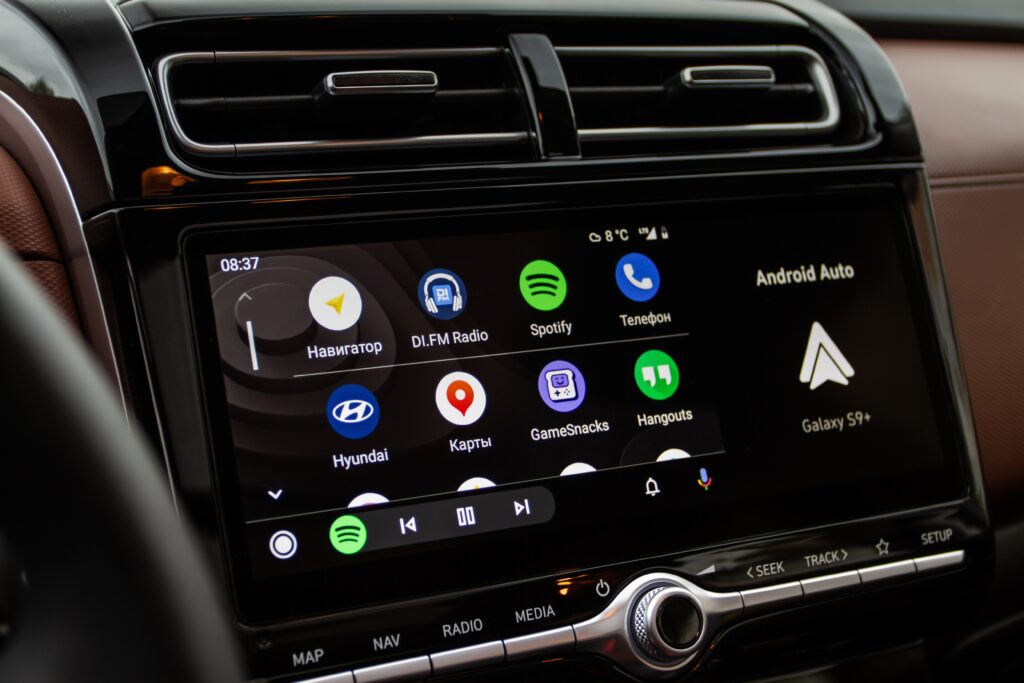Android Automotive OS is an operating system that runs independently in an automotive infotainment system. It is a variant of Google’s Android operating system that has been adapted for in-vehicle cockpit use. In contrast to Android Auto, which only mirrors the content of a connected smartphone, Android Automotive OS is independent of external devices, which allows manufacturers to integrate it more deeply into the vehicle’s infrastructure. As a result, Android Automotive OS can access vehicle information and control functions that are not safety-relevant, such as air conditioning. Several automakers have already expressed interest in using Android Automotive OS in their vehicles.

Many drivers have become accustomed to Android through everyday use of the smartphone, including the popular voice assistants, which are more familiar than the proprietary voice assistance solutions offered by automobile manufacturers. They also prefer this system because Google and the Android community regularly keep the operating system up to date.
However, the most important reason for the introduction of Android is that drivers can use many services through Google Automotive Services (GAS). Consumers are already familiar with such services that they use to download APPs from the Google Play Store to their mobile devices. As with the Play Store, the GAS enables third-party developers to deliver Android applications that meet nearly any customer need. No automaker could match such a wide range of applications to meet customer needs.
Another important reason is that Android is not only practical for end-users, but it also helps manufacturers and suppliers to develop their IVIs. It provides de facto standard interfaces such as Audio control and playback, media playback, storage device management (USB drives, SD cards, etc.), support for 2D and 3D graphics playback, wireless connectivity (e.g., Bluetooth, Wi-Fi), cameras, input (e.g., B. Touch, keyboard), etc. With Android Automotive OS, Google can offer automotive companies a high degree of freedom, which allows them to design the operating system according to their requirements.
There is strong evidence that open source operating systems, and in particular Android, will emerge as a de facto standard in the In-vehicle Infotainment System (IVI) domain. Major OEMs, such as Volvo Cars, Renault-Nissan-Mitsubishi, General Motors, PSA, and FCA, have recently announced their intentions to adopt Android Automotive OS.
To boost the adoption of Android in the Automotive domain, OpenSynergy provides complimentary Automotive-Grade software components tailored for Android Open Source Project (AOSP). AOSP is the repository that hosts the Android Automotive OS.

Android Automotive OS has a pre-integrated open source virtualization framework (VIRTIO) and can be integrated into virtualized platforms that support VIRTIO. VIRTIO is an industry standard currently finding its way into the automotive industry. The OASIS Open consortium promotes and maintains this standard for “OASIS (VIRTIO) Virtual I/O Device standard.” OpenSynergy and Google are members of OASIS, and they are working together on deploying open standards in the automotive domain. There where the automotive-specific VIRTIO interfaces are missing, the two companies are working within the OASIS consortium to close the gap.
This is why OpenSynergy provides a mature VIRTIO-based virtualization platform that it has tailored especially to automotive applications. The company uses VIRTIO for its COQOS Hypervisor SDK features. This SDK is currently the most mature virtualized platform for automobiles with an open standard on the market and, therefore, the perfect companion for a virtualized Android automotive operating system. COQOS Hypervisor SDK guarantees secure integration with other operating systems, such as Linux, an RTOS, or other Android instances. Each operating system can have different functional safety requirements (= different ASIL levels) because it runs in a separate virtual machine. The operating systems run entirely independently.
Google is currently collaborating with OpenSynergy and Qualcomm to ensure that Android Automotive OS can run in a virtualized environment without changes while still complying with all Android compatibility requirements, such as Compatibility Definition Document (CDD), Compatibility Test Suite (CTS). The outcome of this cooperation is a virtualized reference platform that reduces development cost and time by simplifying the deployment and maintenance of Android. Further, it facilitates the migration and update of Android when running on a VIRTIO-based virtualization platform.
The latest version of the COQOS Hypervisor SDK supports various VIRTIO devices, and this includes all the devices that Android Automotive OS needs for seamless integration with an IVI-System.
OpenSynergy provides this support in detail:
This support results in the following advantages for customers who use Android Automotive OS in their IVI:

Android currently comes with an app allowing Internet Radio (also called IP radio), but not traditional broadcast radio (such as FM, AM, DAB, or HD Radio). Internet radio apps increase the number of radio stations that can be received compared to traditional radio standards such as FM, DAB, or HD radio. Drivers expect radio consistent quality in radio reception in any location and at any speed. Currently, only conventional radio receivers can meet this requirement, so this is why the Radio Tuner SDK from OpenSynergy complements Android Automotive OS.
The Radio Tuner SDK contains all the necessary control and driver software components to implement the traditional broadcast radio functionality. It also supports a wide variety of commonly used automotive tuner system-on-chip (SoC) solutions. Finally, it implements Software Defined Radio (SDR). This means the software implementation of components traditionally implemented in hardware, such as standard digital radio decoders.
The advantages of the Radio Tuner SDK as a supplement to the Android Automotive OS:





By loading the video, you agree to Vimeo’s privacy policy.
Learn more

By loading the video, you agree to Vimeo’s privacy policy.
Learn more

By loading the video, you agree to Vimeo’s privacy policy.
Learn more



Note: Our offers are directed exclusively to B2B customers.


By loading the video, you agree to Vimeo’s privacy policy.
Learn more